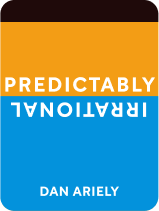

This article is an excerpt from the Shortform book guide to "Predictably Irrational" by Dan Ariely. Shortform has the world's best summaries and analyses of books you should be reading.
Like this article? Sign up for a free trial here .
What is the tragedy of the commons? How can mistrust in corporations lead to the mistrust of our peers? How can we work on becoming more trusting in the future?
The tragedy of the commons is the concept that everybody shares common resources and if we all respect them, then everybody can prosper. But, inevitably, a minority of the population will take advantage of the trust system and ruin the commons for everybody. Companies everywhere do this to us every day and it causes inherent mistrust of others.
Keep reading to learn what causes trust issues and what we can do to improve the situation.
How Dishonest Marketing Causes Trust Issues
What causes trust issues? In this article, we’ll discuss how marketing tricks have eroded our trust in one another and how distrust of others leads us to make untrustworthy, irrational choices ourselves.
To understand how mistrust of companies can translate into further-reaching implications in society, it’s important to first understand the concept of the tragedy of the commons. This concept originates from the 1800s when farmers often shared a “commons” at the center of town to graze their livestock. To ensure that the resource was shared fairly—and to prevent overgrazing of the commons—farmers had a set limit on the number of animals they could graze there. The tragedy of the commons was the unfortunate fact that self-interested farmers would realize they could make more money if they added more animals. They would exceed the set limits and, while this made them more money in the short term, eventually rendered the commons unusable for everyone.
In present day, “the tragedy of the commons” is used to discuss the exploitation of public goods and resources. If everyone commits to ensuring that resources aren’t depleted, everyone enjoys the benefits—this is the rational way to consume resources. But, all too often, there are people who act in their short-term self-interest and destroy the resources for everyone in the long term.
Organizations that destroy rainforests to build palm oil plantations, billionaires who underpay their employees to amass more wealth, water companies putting a price on natural springs—we see the tragedy of the commons playing out around us every day. As a result, we naturally feel that we can’t trust others with public resources because it’s likely that an organization will exploit the resource, sooner or later. This general distrust of organizations has far-reaching implications that hinder both interpersonal relationships and altruistic societal developments.
How Trust Issues Causes Untrustworthy Behaviors
Trust is an important and delicate resource. When it’s intact, our benefits are at their maximum. When people act selfishly, they deplete the public resource of trust—and we respond in several irrational ways that further deplete it.
First, we start to apply distrust to everyone instead of just the person or organization in question. A good example of this is the “free money” experiment at MIT. Experimenters set up a stand that advertised free money in denominations ranging from $1 to $50. Only 19% of passersby stopped to take money—and the majority of those who stopped asked if it was a trick or if they needed to complete a task. The experimenters also interviewed those who passed the booth without stopping, who admitted that they didn’t stop because they thought they’d be roped into some type of scheme by doing so.
People are so used to seeing the word “free” thrown around in marketing as a half-truth, with terms and conditions in small print, that they’re programmed to automatically think that any “free” offers must be a type of trick—even when it’s coming from other people, not a company.
Second, we’re more likely to engage in untrustworthy behaviors ourselves when we feel that others are not trustworthy. One place you’ll commonly see this is on dating sites—you figure that most people are lying about their height or their weight. In order to be a competitive candidate on the site, you also lie about your height. Or, you might fudge your experience a little on your résumé, figuring that everyone embellishes some points in order to stand out in the hiring pool.
These dishonest behaviors may be beneficial in the short term, but all they accomplish is a furthering of the cycle of distrust. Those who do act with honesty are punished for doing so—men who don’t lie about their height are overlooked, or a candidate with an unembellished résumé doesn’t land an interview. In the future, they will also resort to untrustworthy behavior, because it’s the only way to be competitive.
Because we feel that most people are untrustworthy, we spend more time and energy on making sure we aren’t being swindled or punished for honesty than on meaningful exchanges and uses of resources. If, rationally, we worked toward building trust instead of focusing on how we can “win,” we would be able to reap more rewards from our exchanges and transactions.
Rebuilding Trust
The only way out of the ongoing cycle of distrust and untrustworthy behaviors is to become more trusting. There are two ways that you can accomplish this:
1) Consciously stop contributing to interpersonal distrust. Understand that trust is an easily exploited resource—make sure that the way you communicate isn’t contradictory or doesn’t rely on confusing or hidden subtext. For example, companies can make sure that their contracts are written in straightforward, easy to understand language instead of legal jargon. Or, you can make a conscious effort to always say what you mean. If you tell an employee that there’s “no rush” on a project, don’t become upset when they don’t start working on it right away.
2) Engage with trustworthy organizations. While working on interpersonal relationships can help establish small pockets of trust, recall that much of people’s general distrust trickles down from distrust of organizations that use resources for selfish gains. To repair your general sense of distrust, you can engage with trustworthy companies that don’t exploit natural resources or the resource of trust.
To accomplish this, look for companies that focus on transparency and prioritize doing the right thing over profit. Consider the Tylenol response in 1982 when cyanide was added to their product and killed seven people. The company stopped production and pulled their stock from shelves, and issued a recall for all Tylenol capsules. In total, their efforts to contain the issue cost them $100 million. The situation could have been devastating for the brand, but they’re still a trusted household name because of their dedication to transparency and their prioritization of customer safety.
When you’re considering if a company is trustworthy, there are several questions you can ask yourself:
- Does this company actively engage with complaints against them and try to do better?
- Does this company engage in initiatives that are important to me, and in the interest of the common good? (For example, reducing carbon emissions or using more sustainable materials.)
- Is this company’s marketing misleading or dishonest?

———End of Preview———
Like what you just read? Read the rest of the world's best book summary and analysis of Dan Ariely's "Predictably Irrational" at Shortform .
Here's what you'll find in our full Predictably Irrational summary :
- How logic is failing you on a daily basis
- How to identify your irrational behaviors
- Why getting something for free can cause you to make bad decisions






